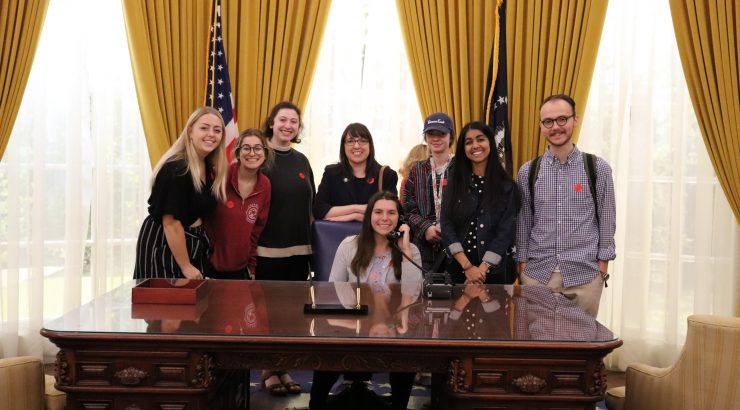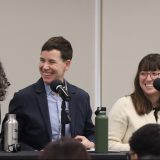Out of the Lab and Into the (Nixon) Library
December 3, 2019
By Sarah Kashani (Political Science, Business, ’22)
In a room filled with Autumnal treats and apple cider, Chapman students and faculty were introduced to archival research methods by Dr. Salim Yaqub, professor of History at the University of California, Santa Barbara. The workshop explored processes by which documents are preserved, declassified, accessed, and interpreted. Drawing on his own research, Dr. Yaqub gave a detailed history on archival methods, much of which focused on the study and preservation of American government documents, and explained the process by which each file was carefully preserved in order to allow for future generations of researchers to be able to use them in their own analyses. The importance of such declassified, preserved files is that they shed light on personal moments which occurred beyond the eyes of the public and gives a glimpse into the history surrounding various events in a less obscured fashion.
Dr. Yaqub educated the participants on the reasons why many of the documents had redacted information. Redacted information on government documents is typically presented as blacked out parts of the document with the intention being to maintain the reputation and public image of the American government. Oftentimes, information is redacted to protect specific politicians or witnesses involved in international disputes or other matters important to the nation. Key cases of this redacted information being declassified via archival research included a cover up of an incident involving an intoxicated Richard Nixon, a government document that suggested restricting access to the polio vaccine for Syrian children as a means of political leverage, and letters which detailed racially insensitive conversations between high profile politicians.
Over the course of a few hours Dr. Yaqub explained the intricate process involved with allowing the public access to previously redacted information on official documents. This process of approval to remove the redacted restriction could sometimes take weeks, months, or even years because certain pieces of information found in many files can still be considered sensitive to matters of national security and interest even after a long period of time has passed since those files were first created. Dr. Yaqub reviewed recent historical trends in declassification and noted that some presidents such as Clinton and Obama often allowed researchers more access to redacted information that was then presented in the public domain, whereas other presidents, such as George W. Bush tended to follow stricter protocol for releasing redacted information and were more likely to be restrictive in the kinds of information that was revealed to the public. This archival presentation prepared everyone for the next day’s field trip to the Richard Nixon Presidential Library and Museum.
At the Richard Nixon Presidential Library and Museum the Chapman group was given a tour by one of the National Archive by archivist Craig Ellefson. He brought the group down to the research room located in the basement, which houses many Nixon Presidential Materials such as photographs, sound bites, moving images, and textual information. In the research room, the fellows learned more about the process of gathering documents and the protocols involved with meeting staff of the national archive to narrow down and categorize thousands of data articles stored at the library. Following their activity in the research room, the fellows toured the art gallery and museum sections of the Richard Nixon Library, learning more about Nixon’s personal traits and history, his presidency, and his role during the Vietnam War.
During the museum tour the fellows were given the opportunity to experience a replica of Richard Nixon’s Oval Office which was gifted by Mr. and Mrs. George Argyros, a graduate of Chapman University and Chairman Emeritus for the Board of Trustees. On loan from Marine One, the Presidential Helicopter was also displayed at the library as a landmark piece of the museum’s collection due to its special history in relation to the resignation of Richard Nixon and the end of his presidency.
Overall, the two-day workshop was an incredible and fulfilling exploration into the qualitative methodologies and processes of archival research, as well as its importance in aiding in public understanding of numerous historical events. Having participated in the workshop, we were motivated and felt confident to pursue archival research projects of our own.
(Pictured above from left to right: Paige Goedderz (’21), Roxy Amirazizi (’22), Hanna Rosenheimer (’20), Dr. Ann Gordon, Leni Fernald (’22), Shreya Sheth (’21), Muhammad Karkoutli (’20) and on the phone is the author, Sarah Kashani (’22))


